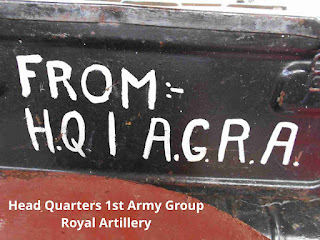....On a heritage railway platform in Totnes, Devon is a metal trunk with an address on it.
Richard Herbert Sutton was born on the 19th August 1918 in Hong Kong with his family later moving to 31 Beccles Road, Great Yarmouth. Richard's father, H. Sutton, was a silk merchant. From January 1926 to April 1930, he attended Gorleston prep school, before moving to Gresham's school in May 1930, where he was editor of the school magazine.
In 1936, he became a history exhibitioner, before going to Jesus College, Cambridge in 1937 to study history. In his third year, he also studied law. According to his tutorial file, Richard's strength of character was praised highly by the College's academic staff, particularly his 'good spirits' and 'hard efforts'. Although tall at 6ft 4, with a build described as less than robust, he was involved with various sports including rowing, hockey, and tennis.
Outside of sport, he had interests in poetry, writing some himself, and public affairs. A Conservative, he was active in the College Debating Society. Richard was also awarded a travel grant in May 1938.
Richard suffered from various medical issues and, although not serious, they had an impact upon his studies. In 1937, he suffered from eye problems, requiring a Certificate in Case of Illness to allow him to stay at home for much of his first term. His condition improved, although the eye problems returned in November 1940. While part of the Officer Training Corps (O.T.C) in the last term of his first year, Richard suffered a riding accident whilst on a parade that resulted in a broken arm. This left him unable to sit for his preliminary examination for History Honours in June 1938. Despite this, he still managed to obtain a 2:1 in June 1939 of the Historical Tripos.
On 10th February 1939, Richard signed up for active duty for the war. He became a Lieutenant in the Royal Artillery, serving in Italy from 1943, but was wounded at Anzio, in March 1944. After the war ended, he joined the Civil Service.
In the UK Imperial War Museum are diaries and letters of Captain Sutton, covering his training and service with the Royal Artillery in North Africa and Italy, 1942 - 1944, describing his journey to North Africa via South Africa (December 1942) where he joined the 8th Army (127th Field Regiment, 51st Highland Division) at Benghazi, his involvement in the advance on Tunis, his posting to the Horse Artillery at the end of the Tunis campaign before rejoining his regiment near Naples in December 1944, his wounding at Anzio (March 1944) and return to action in June, and his involvement in preparing evidence for several courts martial, with some excellent references to morale and daily life in the desert, and the death of friends and contemporaries.
Unfortunately, he became fully blind in 1961 but judging from his tone in letters to his college, he remained in good spirits and wit. Richard died on 22nd October 2002.
I wonder how the South Devon Railway acquired such a historic trunk?
References -
https://collegecollections.jesus.cam.ac.uk/index.php/diary-2;isad?sf_culture=en
https://www.iwm.org.uk/collections/item/object/1030006571











